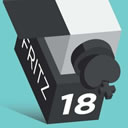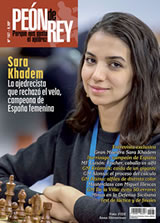The Modernized King's Indian Defense: Averbakh Variation
This book examines such an Averbakh variation with a repertoire for whites and an in-depth analysis of all black responses.
Unloading free sample in the PDF.
Welcome to the wonderful world of the Averbakh Variation against the King's Indian Defence (KID). Who wouldn't want to have a variation against the KID that keeps White's position completely under control, that is positional in nature and that stays out of dark and murky waters or complicated tactical situations? Many players like to play a variation against the KID that bears the stamp of strong grandmasters and has stood the test of time. This book examines such a variation with a repertoire for White and an in-depth analysis of all of Black's answers.
The Averbakh is a solid and respectable variation against the KID. It bears the name of the well-known grandmaster, theorist and specialist in Soviet late Yuri Lvovich Averbakh. He is the oldest living grandmaster who recently celebrated his 99th birthday in Moscow on February 8. In the early 1950s, Averbakh was one of the first grandmasters to play the variation more than once. He contributed enormously to the development of his theory. Averbakh used the variation for several years, then switched to other variations to fight the KID. From time to time, he returned to his former love who by then bore his name.
The Averbakh Variation represents a change in White's approach to fighting the KID. Instead of focusing solely on the queen's flank while accepting some danger of being checkmated on the other side of the board, as happens in KID on many lines, White uses a positional control strategy, in which he uses the calm KID. the positional form. Initially, the character of the battle is relatively calm and positional, but not too calm to land in nearly equal positions immediately. White's development programs follow a strategic logic. In later pieces of the game, White generally retains its advantage of being the first to move, in positions where it retains control.
Averbakh has always been one of the best options against KID. Over the years, it has been performed by many grandmasters such as Lev Polugaevsky, Vadim Milov, Evgeny Bareev, Yasser Seirawan, Tigran Petrosian, Artur Jussupow, Lajos Portisch, Wolfgang Uhlmann and Margeir Petursson, many of whom played Averbakh throughout their careers. his entire chess career. Magnus Carlsen used it to beat Loek van Wely with relative ease at Wijk aan Zee, 2013. Boris Gelfand has played it many times with excellent results (80% in his Chessbase games). Vassily Ivanchuk and Shakhriyar Mamedyarov have played against Averbakh, as have the more than 2700 current players Yu Yangyi and Le Quang Liem.
My analysis is based on the foundations laid by three great authors, Petursson, Kornev and Flear. Margeir Petursson's "Indian Defence of the King - Averbakh Variation" (1996) (pictured) is a small but very interesting monograph devoted to the Averbakh Variation. It is a complete book and has significant theoretical value to this day. Glenn Flear wrote two chapters in "Dangerous Weapons: King's India" (2009) with a summary and many new ideas in the Averbakh. "A practical white repertoire with 1. d4 and 2. c4 - The Defenses of the King's Fianchetto" (2013) by Alexei Kornev is an interesting book, in which Kornev specifies a complete repertoire for White against the KID based on the Averbakh variation. Of course, I will go into detail about all the analyses and suggestions in the numerous KID repertoire books for Black - see bibliography.
It is a phenomenon that has also been identified by other authors: engines do not like KID. Hence a caveat: they constantly overestimate White's odds, especially in close positions. There are positions in so-called deadlock situations, where White has no chance of making his way, where the engines still claim a winning advantage for White. There are positions that are supposedly "winning" for White while they're still closed. After opening the position in the only way possible, the engine's judgment suddenly drops to a "better" for White. The conclusion from this is that the evaluation of the engine must always be put into perspective. In this book, that has been done carefully. The engines are not strictly followed and personal judgment has also been a solid guide. Most of the time, the engine
The optimistic outlook has changed to a more realistic one.
The Averbakh Variation is a hidden gem in the variations against the KID. It's classy, classic and great. It has the history of many iconic chess names who played it and still play it today. It is based on sound strategic principles. Opening hours are easy to learn. The opening often allows Black to be taken off the board, with positional power play, occasional quick king attacks and interesting endings. It is one of the few variations of KID without the standard pawn race, with White's king waiting to be matched on g1.
At the same time, the Averbakh is a demanding opening. Many different structures can develop after opening. In my proposed repertoire, there are common structures for KID Saemisch, KID Makagonov, KID Classical, KID Exchange Variation, but also the Modern Benoni, the Slow Benoni, the Benko Gambit and the Maroczy Bind. White should become familiar with all these opening strategies and associated pawn structures.
Above all, the Averbakh is a very gratifying opening. The development of White's piece follows classical principles. In general, white women are not lagging behind in development. Even without the theoretical knowledge of certain variations, it should be able to find its way. Best of all, Averbakh promises you a lead at the end of the opening, without the mess our KID opponents love to make on the board!
Good luck with this opening. With rigorous and motor-assisted analysis of old and new theory, this book presents a robust repertoire for White. There are plenty of opportunities for White to improve on the known theory or the grandmaster games. Recent developments and knowledge have significantly strengthened White's theoretical case. This has once again made the Averbakh one of the most challenging variations the black has to deal with when playing KID. We can really talk about the Modernised King's Indian Defence - Averbakh Variation!
Data sheet
- Product Type
- Paper
- Language
- English
- Theme
- Openings
- Level
- Club
- Author
- Jan Boekelman
- No Pages
- 400
- Year published
- 2021
- Measurements
- 170 x 235mm
- ISBN
- 9789464201376





